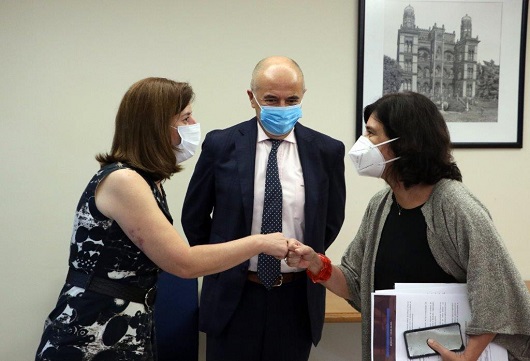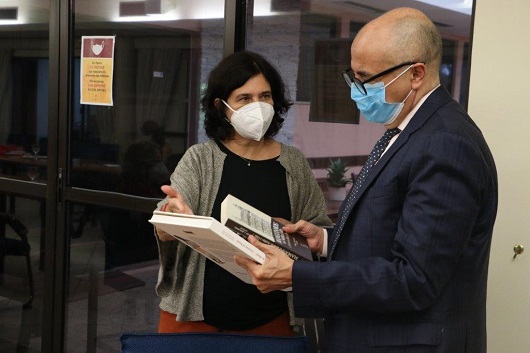During the Mexican consul’s visit to Fiocruz, a promise of more scientific convergence
15/02/2022
Cristina Azevedo (Fiocruz News Agency)
Looking at the map, the distance between the countries is big. Within the American continent, Mexico is the Spanish-speaking country that is farthest away from Brazil. But the two nations are closer to each other than it may seem. Fiocruz and Mexican institutions have joint projects, a cooperation that can expand even further, judging by the interest demonstrated by consul Héctor Humberto Valezzi Zafra. Together with the deputy consul in Rio de Janeiro, Ana Luisa Vallejo Barba, the diplomat was received by Fiocruz president Nísia Trindade Lima last Thursday (February 10th) at the Official Residence.
Nisia Trindade Lima greets Mexican consul and deputy consul at Fiocruz (Image: Peter Ilicciev)
In Brazil since 2019, the consul said he would have liked to visit the Foundation before, but his plans got delayed by the pandemic. He had already visited Fiocruz Brasília in the 1980’s. And now, that his consulate covers Rio de Janeiro and the states of the Brazilian North-East region, he believes there are many fields in which this cooperation can be expanded.
“We are searching for opportunities for possible collaborations after the pandemic. An exchange [of researchers and students] could be one of these areas”, said the diplomat, who asked many questions about the Foundation.
For Fiocruz's president, there is room for this cooperation to grow. “The possibilities are numerous”, she said. “We have been thinking a lot on how to further strengthen relations with Latin America. As I see it, our countries, a bit in that threshold between low-income countries and developed countries, end up losing much of their potency and visibility”.
Education without borders
During the meeting, the vice-president of Education, Information and Communication (VPEIC), Cristiani Vieira Machado, said she sees many elements that are shared by both countries, as well as plenty of potentials to increase cooperation in research, education, and scientific development.
Nisia Trindade Lima gave Valezzi Zafra a book about Manguinhos Campus' history and received a publication about Maya civilization (Image: Peter Ilicciev)
In the field of education, there are opportunities not only for exchanges, but for remote professional qualification as well. An example of this is the online course on COVID-19 management: launched in March 2020, it has been watched by over 60 thousand students, not only from Brazil but from 30 other countries as well. Today, Fiocruz offers 11 online courses on the disease. “We don’t have many students from Mexico. We could receive more and send more”, said Machado.
Pedro Burger, the assistant coordinator of the Fiocruz Global Health Center (CRIS/Fiocruz), explained that the Training Program for Human Milk Banks, through which the Foundation has sent employees to train professionals in Mexico, was a bilateral cooperation, but within the context of the International Network of Human Milk Banks - The Fernandes Figueira National Institute of Women’s, Children’s and Adolescents’ Health (IFF/Fiocruz) is a Collaborating Center of PAHO/WHO in this subject.
There are also collaborations through the Network of National Public Health Institutes of Latin America, between Fiocruz and the Mexican National Health Institute, and the Network of Public Health Schools, by means of the Autonomous University of the State of Mexico (Unam), with which Fiocruz has a memorandum of understanding. “We can grow even more in the partnerships with Mexico”, said Burger.
This approximation sometimes occurs thanks to personal initiatives. Maria Rachel Fróes da Fonseca, a researcher of the Casa de Oswaldo Cruz (COC), talked about her doctorate and post-doctorate project, in which she compared science in the two countries in the 19th century and in the early 20th century. “Although this is about a personal trajectory, it shows how researchers have been intensifying their relations”, she said.
At the meeting, Lima gave the consul a book on the history of Fiocruz Manguinhos' Campus and was given a book on Maya civilization. The meeting was also attended by Valber Frutuoso, advisor to the Presidency’s Secretariat for Institutional Relations.



